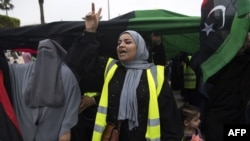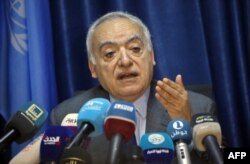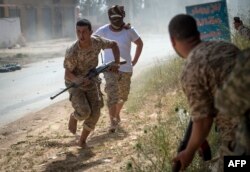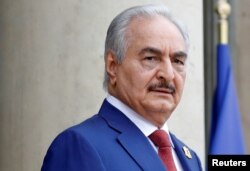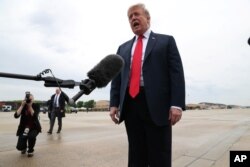The assault on Tripoli launched April 4 by Libya's would-be strongman Khalifa Haftar, a Gadhafi-era general, and his self-styled Libyan National Army (LNA) appeared Friday to be flagging, with his forces withdrawing from some of the capital's southern suburbs amid heavy clashes.
Leaders of the country's beleaguered, internationally recognized government are dismissing a behind-the-scenes effort by the U.N. special envoy, Ghassan Salame, for a cease-fire, suggesting they are more confident now of retaining their hold on the Libyan capital.
"It felt like thunder was going to split my house," Libyan-American Holima El Haj, a mother of two, told VOA by phone. "I was crying, and I don't normally do that."
Muhanad Younis, the spokesman for the Tripoli-based Government of National Accord (GNA), told reporters there's no question of a cease-fire. He said Libyan Prime Minister Fayez al-Serraj was determined to thwart the assault on the capital led by Haftar, who's allied with a rival government in the east of the North African country.
There will be "no negotiations or dialogue until after defeating the aggressors," al-Serraj said.
Stephane Dujarric, spokesman for U.N. Secretary-General António Guterres, told reporters in New York that there's "grave concern" about "the indiscriminate shelling of civilian areas in Tripoli" and urged all parties to protect civilians. According to the International Organization for Migration, more than 39,000 people have been displaced by the clashes.
Much of the fighting now, according to government military officials who discussed the flow and ebb of the battles, has been focusing on the suburb of Ain Zara in southern Tripoli. There have also been reports of fierce fighting around Wadi Rabea and Tripoli International Airport.
GNA officials say Tripoli forces have been gaining ground and threaten to cut off LNA supply lines running from Gharian, a town 80 kilometers (50 miles) south of Tripoli, which is serving as the LNA's forward headquarters for the assault on Tripoli.
"We won't agree to a cease-fire," Abdulraham El Mansouri, an adviser to the GNA, told VOA. "If we agree to one, Haftar will only use the time to regroup his forces, and we won't allow that."
He said the forces loyal to the GNA, which are made up mainly of an assortment of fighters drawn from the powerful and battle-hardened militias of Tripoli and Misrata, won't stop fighting during the holy month of Ramadan, due to start on the evening May 5. "We won't stop until we have driven Haftar all the way back to Benghazi and Tobruk, and we'll finish him there."
Some independent analysts agree that Tripoli now may be beyond Haftar. His forces are "dangerously stretched," said Federica Saini Fasanotti, an analyst with the Brookings Institution, a Washington-based think tank. She said LNA soldiers captured by forces loyal to the Tripoli government "are very young and clearly not up to the task."
Many of the fighters the LNA is battling are veterans of the 2011 uprising against Col. Moammar Gadhafi. Haftar's forces are also drawn from less cohesive groups, including mercenaries from Chad and Sudan. The edge Haftar does have, say analysts, is in the backing he's receiving from Egypt and the United Arab Emirates in terms of supplies, which appear to include armed drones.
"Haftar definitely overestimated his strength and underestimated his adversary," said Karim Mezran, an analyst with the Atlantic Council's Rafik Hariri Center for the Middle East. His offensive prompted the country's most powerful western militias from Tripoli, Misrata and Zintan — frequently at odds with each other in the past — to join forces in support of al-Serraj, he said.
But Mezran and other analysts say the GNA forces are probably incapable of capturing the LNA loyalist cities of Benghazi and Tobruk if Haftar is forced to withdraw from around Tripoli.
"The United States, so far, along with Italy and Britain, has had a very straightforward position: There is no military solution possible in Libya, only a U.N.-backed negotiations process," said Mezran.
Last week, it emerged that U.S. President Donald Trump might be considering reversing Washington's position. In a phone call with Haftar, the U.S. leader praised the general for his fight against the Islamic State and other jihadists. Bloomberg News reported Trump told Haftar he supported an attack on Tripoli.
But State Department officials told VOA that U.S. policy remains the same: Only a negotiated settlement can end conflict in Libya.
The U.N.'s special envoy to Libya, Salame, told reporters in Rome on Friday that he was exploring ways "to convince the parties to the conflict to stop fighting and resume the political process."
He added: "The U.N. continues its role in Libya. We have been providing assistance to thousands of families affected by the fighting to be relocated to safer areas. … The mission continues efforts to bring together the various parties in hope that they can recognize, before Ramadan, that it is better to stick to the political process than further fighting where there is no winner while the country is losing."




